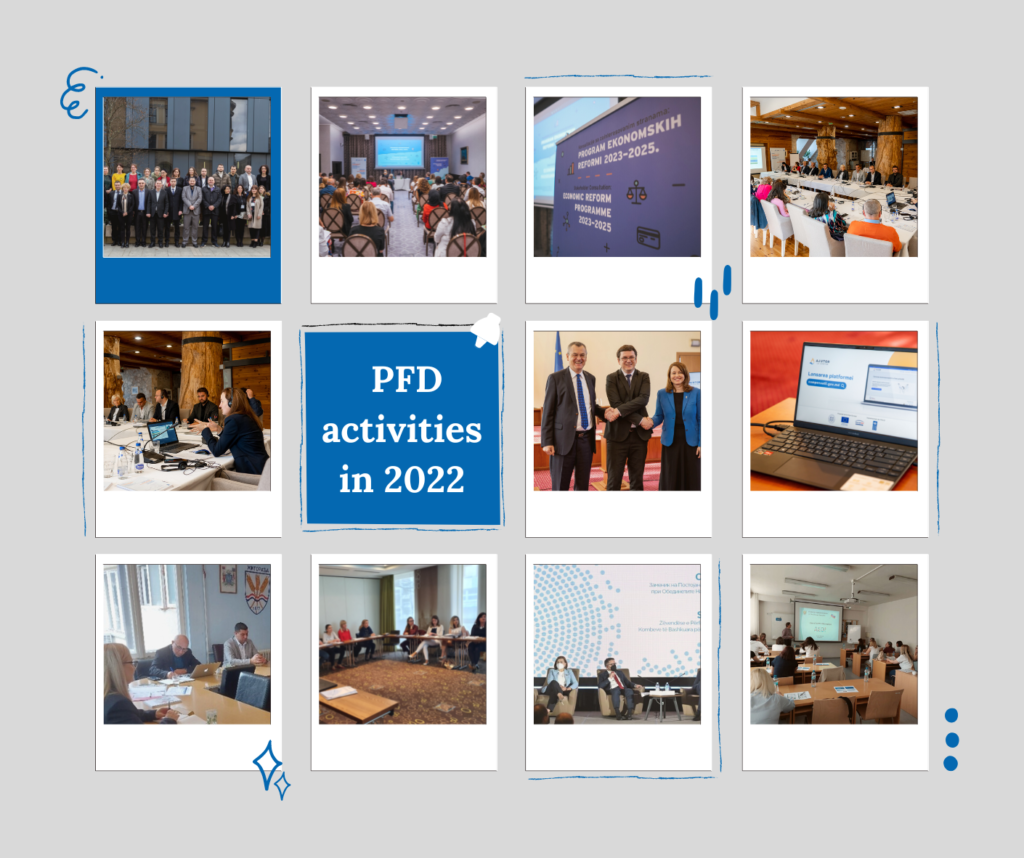Despite global challenges the world was facing in 2022, reform processes in Public Finance for Development (PFD) programme partner countries have been progressing.
Here’s what improvements in public financial management one could see in 2022 thanks to projects supported by the Slovak Ministry of Finance. Examples include, but are not limited to: strengthened strategic planning in Bosnia and Herzegovina, increased budgetary performance in Moldova, more comprehensive economic policy of Montenegro, better transfer pricing in North Macedonia, and improved local economic development in Serbia.
Bosnia and Herzegovina creates fiscal space for SDGs
Having coherent systems in place is a precondition for translating Agenda 2030 into government policies, legislation and actions. Sub-national government levels in Bosnia and Herzegovina like Republika Srpska have made significant progress towards effective strategic planning and overall development management. The system is in line with financial mid-term and annual budget planning. However, a number of challenges are faced in practical implementation of the new legislation.
Another task for the government in BiH is to create an SDG financing framework. SDG-based public expenditure reviews conducted across government levels in 2022 will be an important input in the process. They produced a valuable overview of financial allocations for sustainable development priorities, which will help define the priorities that the government should focus on in the coming years. In addition, UNDP conducted a review of sustainable development financing instruments applied globally to identify instruments that could be implemented in the country.
The PFD programme results sustainability is demonstrated by establishing partnership within the existing Training System for Civil Servants. Design and delivery of a joint training programme ensures that knowledge created under the project will be sustained in the national training system and available to civil servants across the country. It has led to closing the capacity gaps in internal controls in 15 local and 2 cantonal governments.
Moldova increases budgetary performance
The interest of the Government of Moldova to improve public financial management increased after conducting a Development Finance Assessment (DFA). The review of existing financial instruments provided opportunities to mobilize new additional financial resources to finance national priorities aligned to SDGs.
Another evaluation is being carried out in the health sector, after it was successfully implemented in the past in the education and agriculture sectors. The public spending review plans to identify at least 5% of the savings in the current budget allocations and reallocate them more efficiently to other priorities within the sector. With the support of Slovak experts, representatives of the Ministry of Finance and Ministry of Health have been trained to assess the efficiency of the public expenditure allocated in the health sector.
Montenegro involves citizens in public policies
Economic policy of Montenegro for the next three years is outlined in the Economic Reform Programme 2022-2024. The document, which represents the basis for the economic dialogue in the EU integrations, was prepared with the assistance of international and national experts provided within the PFD programme. The European Commission positively evaluated reforms selected as well as the entire process of the document preparation.
UNDP and Slovak Ministry of Finance, together with the Montenegrin Ministry of Finance, also focus on citizen participation. Three concepts have been introduced that should enhance citizen participation in monitoring of the public policies and services implementation: programme budgeting, mid-term budget framework, and capital budgeting. Their introduction is a legally required obligation for the Montenegrin municipalities, and it was supported through the provision of comprehensive PFD project assistance from the very beginning.
North Macedonia unlocks tax revenue collection
The PFD project in Republic of North Macedonia has had significant contribution in the country’s Public Finance Management Reform with major impact in transfer pricing. It has done so through increasing capacities of the Public Revenue Office and the producing of the first ever transfer pricing reports in the country. Internal acts, technical specification for digital system and new law for automatic exchange of information for tax purposes of the Public Revenue Office and the Ministry of Finance have been developed. This strengthens country’s capacities to deal efficiently with tax evasions in line with international standards.
Project activities contributed to successful increase of tax collection efficiency at the municipal level by piloting a digital tool for calculation and administration of property tax in Sveti Nikole. As a result, the municipality increased tax collection to 220%. The project also helped national authorities and the Ministry of Finance to put informal economy higher on their agenda, e.g. with the development of an Action plan for its reduction as well as indicators for its measurement and monitoring. The capacity building activities for the State Audit Office in the area of auditing of accrual financial statements, value for money performance audit and local self-government audit contributed to strengthen the role of the SAO as guardian of the public funds.
Serbia speeds up economic development at the municipal level
In Serbia, the Slovak Republic has been recognised by the donor community in the country as a strong supporter of local economic development. Most of local self-governments (LSGs) in Serbia do not possess the minimal requirements for managing complex activities related to municipal planning and economic development. Budgets are still mostly planned annually in spite of legislative requirements that take into account three-year investment needs. Slovak expert Jan Marusinec prepared and presented a comparative, comprehensive study on municipal Medium-term budgetary frameworks (MTBFs) and fiscal arrangements that allow the LSGs to extend the horizon for fiscal policy making beyond the annual budgetary calendar.
Project efforts to improve governance and economic planning at the local level have borne fruit. In 2022, five local parliaments adopted their Development Plans and four LSGs developed Medium-Term Plans in line with the new Law on Planning System.
You can read more about Public Finance for Development programme in each of the countries here.


